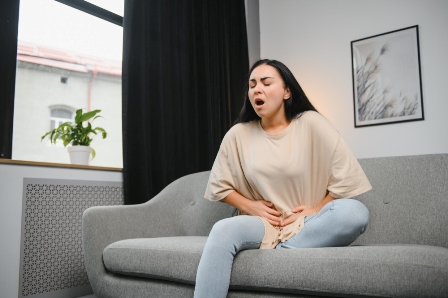We often hear the phrase, “listen to your body.” And in the context of menstruation, this advice holds particular value. Knowing the signs that your period is about to start can help you better prepare for it, both physically and mentally.
What is menstruation?
Menstruation is a natural biological process that women and people with female reproductive systems experience. It involves the shedding of the uterine lining, also known as the endometrium.

1. How can I understand my Period is Coming Soon
As a woman, being in tune with your body is essential, especially when it comes to your menstrual cycle. Knowing when your period is about to start can help you be prepared and manage any discomfort that may come with it. While every woman’s body is unique and may experience different symptoms, here are some common signs that your period is coming tomorrow:
1.1. Menstrual Tracking
Keeping track of your menstrual cycle is a valuable tool for predicting when your period will arrive. Use a calendar or one of the many menstrual tracking apps available to record the start and end dates of your previous periods. By identifying patterns in your cycle, you can estimate when your next period is due.
1.2. Changes in Cervical Mucus
As your body prepares for menstruation, you may notice changes in the texture and appearance of your cervical mucus. It may become thicker and stickier, resembling the texture of raw egg whites. This change is an indication that you are nearing the start of your period.
1.3. Breast Tenderness
Hormonal fluctuations before menstruation can lead to breast tenderness or sensitivity. You may notice that your breasts feel swollen, achy, or tender to the touch. This symptom is a common premenstrual sign experienced by many women.
1.4. Abdominal Bloating
Feeling bloated in the days leading up to your period is a common occurrence. Hormonal changes can cause water retention and gas buildup, resulting in a feeling of fullness and discomfort in the abdominal area.
1.5. Mood Swings and Irritability
Premenstrual syndrome (PMS) can trigger mood swings, irritability, and emotional sensitivity. Fluctuating hormones, particularly estrogen and progesterone, can affect neurotransmitters in the brain, leading to these emotional changes.

1.6. Food Cravings
Do you find yourself having intense cravings for certain foods, especially sweet or salty treats, as your period approaches? Hormonal changes can influence your appetite and food preferences during this time.
1.7. Fatigue and Low Energy
Feeling more fatigued and experiencing lower energy levels before your period is not uncommon. Hormonal fluctuations can disrupt your sleep patterns, leaving you feeling drained and lethargic.
1.8. Headaches
Hormonal shifts can also trigger headaches or migraines in some women. If you notice an increase in headaches around the time of your period, it may be a sign that it’s on its way.
1.9. Acne Breakouts
Fluctuating hormones can cause an increase in sebum production, leading to acne breakouts. If you notice more pimples or blemishes than usual, it could be linked to your menstrual cycle.
1.10. Lower Back Pain
Many women experience lower back pain or cramping before and during their period. This discomfort is caused by contractions of the uterine muscles as it prepares to shed its lining.

1.11. Changes in Bowel Movements
Hormonal changes can impact bowel movements, leading to constipation or diarrhea before your period. This is a common occurrence and can vary from woman to woman.
1.12. Heightened Sensitivity to Smells
Some women may notice a heightened sensitivity to smells before their period. Odors that were previously unnoticeable might become overwhelming during this time.
By being aware of these signs, you can better prepare yourself for your period’s arrival and take any necessary measures to make this time of the month more comfortable.
2. What to do to Manage Periods Signs and Symptoms?
Dealing with the signs and symptoms of your period can be challenging, but there are several strategies and lifestyle adjustments that can help you manage this time of the month more comfortably. Here are some tips to effectively handle your period’s signs and symptoms:
2.1. Menstrual Tracking
Keeping track of your menstrual cycle is the first step in managing your period’s signs and symptoms. Use a calendar or a menstrual tracking app to record the start and end dates of your periods. This will help you predict when your period is coming and prepare accordingly.
2.2. Pain Relief
If you experience menstrual cramps, consider over-the-counter pain relievers such as ibuprofen or naproxen. These medications can help alleviate discomfort and reduce inflammation. Always follow the recommended dosage and consult your healthcare provider if you have any concerns.
2.3. Heat Therapy
Applying a heating pad or taking a warm bath can provide soothing relief for abdominal cramps. Heat helps relax the muscles and ease pain. Just ensure not to use a heating pad for an extended period and avoid falling asleep with it on.
2.4. Stay Hydrated
Drinking plenty of water during your period can help reduce bloating and water retention. Staying hydrated is essential for overall health, and it can also help ease some of the discomfort associated with menstruation.
2.5. Balanced Diet
Maintaining a balanced and nutritious diet can play a significant role in managing period symptoms. Include foods rich in vitamins, minerals, and fiber, and try to minimize your intake of salty, sugary, and processed foods.
2.6. Exercise Regularly
Engaging in regular physical activity can help alleviate menstrual symptoms. Exercise releases endorphins, which are natural mood boosters, and it may also help reduce cramping and bloating. Choose activities you enjoy, such as walking, swimming, or yoga.
2.7. Stress Management
Stress can exacerbate premenstrual symptoms, so finding effective stress management techniques is crucial. Consider practices like meditation, deep breathing exercises, or spending time in nature to relax and unwind.
2.8. Get Plenty of Rest
Ensuring you get enough sleep during your period can help combat fatigue and increase overall well-being. Create a calming bedtime routine and aim for 7-9 hours of quality sleep each night.
2.9. Comfortable Clothing
Wearing comfortable and loose-fitting clothing during your period can help reduce abdominal discomfort and allow for better airflow. Choose fabrics that are breathable and gentle on your skin.
Remember that each woman’s menstrual experience is unique, and what works for one person may not work for another. It may take some time and experimentation to find the strategies that best help you manage your period’s signs and symptoms effectively.
3. Signs of Period Coming Late
Experiencing a late period can be a source of anxiety for many women. While occasional irregularities in the menstrual cycle are relatively common and often not a cause for concern, it’s essential to understand the potential signs of a late period and what might be causing it. Here are some common signs of a period coming late:
3.1. Missed Period
The most apparent sign of a late period is, of course, when it doesn’t arrive on its expected date. If you have a regular menstrual cycle and your period is more than a few days late, it may be a sign that it’s delayed.

3.2. Breast Tenderness
Breast tenderness is a typical symptom before menstruation. If you experience breast tenderness, but your period hasn’t arrived, it could indicate a delayed cycle.
3.3. Abdominal Cramps
Some women may experience mild abdominal cramps or discomfort even when their period is delayed. This can be confusing, as it’s a symptom commonly associated with the onset of menstruation.
3.4. Spotting
Spotting refers to light, irregular bleeding that occurs outside of your regular menstrual period. If you notice spotting and no full menstrual flow follows, it might indicate a delayed period.
3.5. Changes in Cervical Mucus
Changes in cervical mucus are often associated with different stages of the menstrual cycle. If you notice significant changes in your cervical mucus, but your period doesn’t arrive, it could be a sign of a late period.
3.6. Stress and Anxiety
Stress and anxiety can have a significant impact on the menstrual cycle. High levels of stress can disrupt hormonal balance, potentially leading to a delayed period.
3.7. Hormonal Imbalance
Fluctuations in hormone levels can cause irregularities in the menstrual cycle. Factors such as polycystic ovary syndrome (PCOS), thyroid issues, or hormonal birth control can contribute to a late period.
3.8. Weight Fluctuations
Significant weight gain or loss can affect the menstrual cycle. If you’ve experienced substantial changes in your weight, it might be a reason for your period being late.
3.9. Medical Conditions
Certain medical conditions, such as pelvic inflammatory disease (PID) or endometriosis, can lead to menstrual irregularities, including a delayed period.
3.10. Perimenopause
As women approach menopause, their menstrual cycles may become irregular. Perimenopause, the transitional phase before menopause, can cause late or missed periods.
It’s important to remember that occasional late periods are not unusual, especially during times of stress or significant life changes. However, if you experience persistent irregularities, it’s essential to speak with a healthcare provider to rule out any underlying health concerns and address any potential issues.
4. How to Get Period Soon
Here are a few suggestions that people commonly mention:
4.1 Herbal Teas:
Some herbal teas, such as ginger tea or parsley tea, are believed to have emmenagogue properties, which means they may stimulate menstrual flow. However, there is limited scientific evidence to support their effectiveness.
4.2 Physical Activity:
Engaging in moderate exercise can help regulate hormones and promote a regular menstrual cycle. However, excessive or intense exercise can have the opposite effect, so it’s essential to strike a balance.
4.3 Papaya:
Papaya is rumored to have properties that could induce menstruation. Eating ripe papaya or drinking papaya juice might be suggested by some, but there is no strong scientific evidence to back this claim.
4.4 Pineapple:
Similarly, consuming large amounts of pineapple is believed by some to help bring on menstruation, but there is little scientific evidence to support this claim.
4.5 Hot Baths:
Taking warm baths is known to relax the body, and some people believe that it could help trigger menstruation. However, more research is needed to confirm this.
4.6 Menstrual Products:
Some people report that using certain menstrual products, such as menstrual cups, might help induce their period. However, there is no solid scientific evidence to back this up.
5. Summing Up on Signs Your Period is Coming Tomorrow
Knowing the signs that indicate your period is coming tomorrow can be beneficial for women to better prepare and manage their menstrual cycle. Here is a summary of the common signs to look out for:
5.1 Menstrual Tracking:
Keep track of your menstrual cycle using apps or calendars to predict your period’s arrival based on past patterns.
5.2 Cervical Mucus Changes:
Notice changes in cervical mucus, such as thickness and stickiness, as an indicator of approaching menstruation.
5.3 Breast Tenderness:
Experience breast swelling and sensitivity due to hormonal fluctuations before your period.
5.4 Abdominal Bloating:
Feel a sense of fullness and discomfort in the abdominal area due to hormonal changes leading to water retention and gas buildup.
5.5 Mood Swings and Irritability:
Be aware of mood swings and emotional sensitivity caused by fluctuating hormones, particularly estrogen and progesterone.
5.6 Food Cravings:
Notice changes in appetite, especially cravings for sweet or salty foods, as hormonal influences on appetite occur.
5.7 Fatigue and Low Energy:
Experience fatigue and lethargy due to hormonal disruptions affecting sleep patterns.
5.8 Headaches:
Be mindful of increased headaches or migraines associated with hormonal shifts.
5.9 Acne Breakouts:
Observe an increase in pimples or blemishes due to elevated sebum production.
By recognizing these signs, women can better prepare for their period and address any discomfort that may arise. Tracking and understanding their menstrual cycle empowers women to manage this natural process more effectively.
6. FAQs
Here are answers to some frequently asked questions about Signs Your Period is Coming Tomorrow
A1: You can look for signs such as changes in cervical mucus, breast tenderness, abdominal bloating, mood swings, food cravings, fatigue, and lower back pain. Tracking your menstrual cycle and using menstrual apps can also help predict its arrival.
A2: Your body might give you signals like breast tenderness, mood swings, bloating, and changes in cervical mucus. Keeping track of your cycle and any premenstrual symptoms can indicate that your period is approaching.
A3: Right before your period, you might experience premenstrual symptoms like breast tenderness, mood swings, bloating, and changes in appetite. Your cervical mucus may become thicker and stickier as well.
A4: It’s not advisable to try to induce your period artificially. The menstrual cycle is a natural process regulated by hormones, and interfering with it can have adverse effects on your health.
A5: Discharge before a period refers to changes in cervical mucus that occur during the menstrual cycle. Before your period, the mucus may become thicker and stickier, resembling the texture of raw egg whites.
A6: Menstrual cycles can vary, and occasional irregularities are common. A period can be a few days to a week late due to factors like stress, hormonal changes, or medical conditions. If you have concerns, consult a healthcare professional for evaluation.
Conclusion
Being in tune with your body and recognizing the signs that your period is coming tomorrow can be empowering for women. The 12 signs discussed in this article, including menstrual tracking, changes in cervical mucus, breast tenderness, abdominal bloating, mood swings, food cravings, fatigue, headaches, acne breakouts, lower back pain, changes in bowel movements, and heightened sensitivity to smells, can serve as valuable indicators of an impending menstrual cycle.
Understanding these signs allows women to better prepare for their period’s arrival and take necessary steps to manage any discomfort that may arise. By embracing a proactive approach, women can make their menstrual experience more comfortable and navigate their cycle with confidence.

